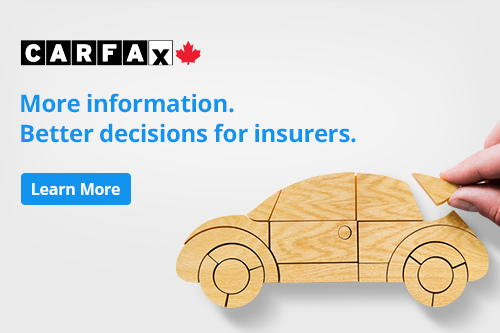

This article was provided by CARFAX Canada.
Did you know that in the US, 130 of the top 150 insurance carriers use CARFAX vehicle history data to improve underwriting and boost claims efficiency? In fact, CARFAX vehicle history data has proven to be highly correlated with loss ratios. Here are some of the most valuable data points for insurers:
Based on CARFAX Canada analysis, it’s estimated that there are more than 192,000 vehicles on the road in Canada that have odometers that have been tampered with.
Odometer readings from service records are the best source of accurate odometer information because the readings are not self-reported (unlike provincial registration records). CARFAX Canada has added over 30 million new service records so far this year1, helping our customers to extrapolate mileage information and identify potential odometer problems.
Based on research conducted by CARFAX US, vehicles that have a history of severe problems are more likely to have more future accidents and cost more to repair.
CARFAX Canada’s vehicle history data can flag many severe problems including a stolen vehicle check (for vehicles that are actively reported as stolen), negative or title branding (Salvage, Rebuilt, Junk, Frame Damage, Fire, Flood, etc.), and accumulated accident damage over specific thresholds – all with associated dates.
CARFAX US research has also shown that vehicles with minor damage end up having higher losses than vehicles that don’t have a similar history. As well, the more minor damage events in a vehicle’s history, the worse its loss performance. In fact, vehicles with more than five minor damage events have losses similar to those with major damage in their history.
In addition to flagging severe problems, vehicle history information from CARFAX Canada can also provide visibility into minor accident and damage events such as hail damage and vandalism.
Knowing the history of ownership is a very powerful predictor of future losses. CARFAX US studies have shown that the longer a vehicle is owned by a single owner, the less it costs to provide coverage for that vehicle. On the flip side, vehicles that have had multiple owners have a higher chance of not being properly maintained at some point in their lifecycle, and, as a result, they have more losses and attract lower valuations (which is particularly important in total loss compensation).
Garage flipping and misrepresentation of ownership type/vehicle are just two types of insurance fraud that are increasingly common. CARFAX Canada vehicle history data such as vehicle decode, service records and locations, ownership type, and potential VIN cloning can be used to help identify these types of fraud.
With so much information available, it’s imperative to understand which data points are most relevant for your business, and to have that data at your fingertips. CARFAX Canada vehicle history information can be customized to suit various business functions, and the delivery format can be tailored to suit your needs, including APIs and user portals.
For more information, or to request a no-cost data evaluation, visit go.carfax.ca/big.
The information in this article is based on the experience of the CARFAX Banking & Insurance Group in the U.S. CARFAX Canada is pleased to be able to offer similar vehicle history services to insurance companies here in Canada.
1 CARFAX Canada Data, Oct. 2021

Mike Foster is the director of banking and insurance at CARFAX Canada. Mike has 30 years of diverse automotive industry experience working with OEMs, captives, auto finance companies, and insurers. Over the past several years, he has led financial services solution development by advocating on behalf of auto lenders and insurance carriers, aligning CARFAX Canada’s industry leading vehicle history data with their needs.
In the insurance space, Mike and his sales team work with carriers to improve underwriting and claims decision-making and overall business processes. This is done in part by providing proof-of-concept data sampling, customized product and data offerings, implementation, and ongoing support.

Don Hendriks is a data scientist and actuary. He leads the CARFAX US insurance analytics team, helping their business partners to integrate vehicle-specific data into underwriting rules, rating plans, and predictive models.
Don began his insurance career as a consultant with an international actuarial consulting firm, evaluating funding levels for self-insurance plans, and setting rates and reserve levels for a variety of insurance customers. He later served in several roles of increasing responsibility for large, national carriers, supporting both pricing and reserving functions. Don moved on to actuarial, product development and predictive modelling roles at several regional insurance companies.
